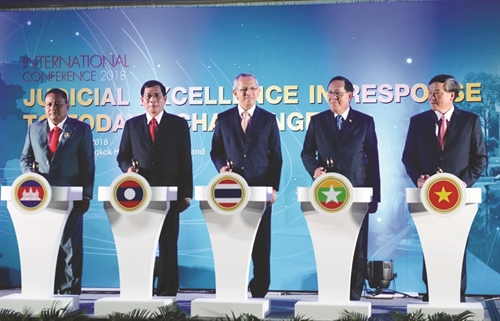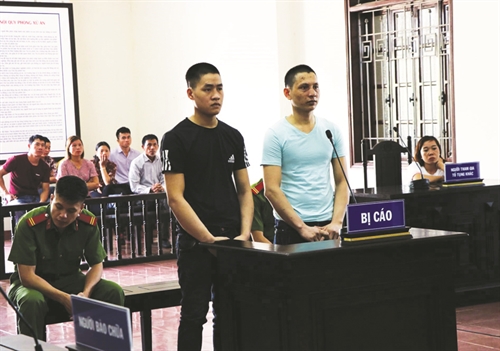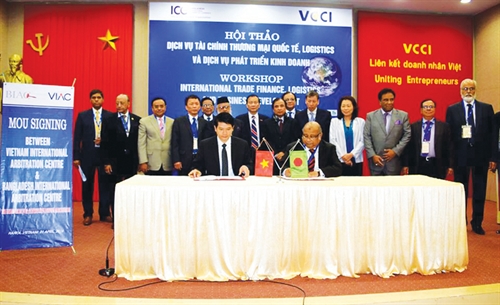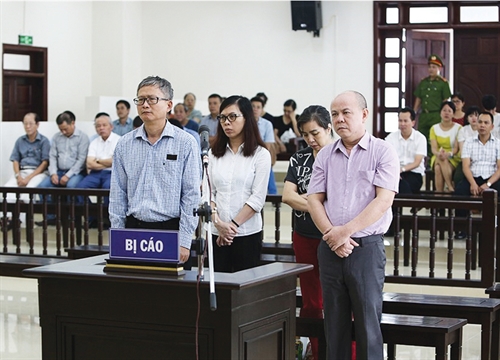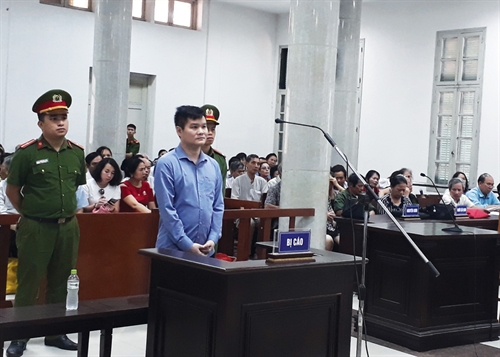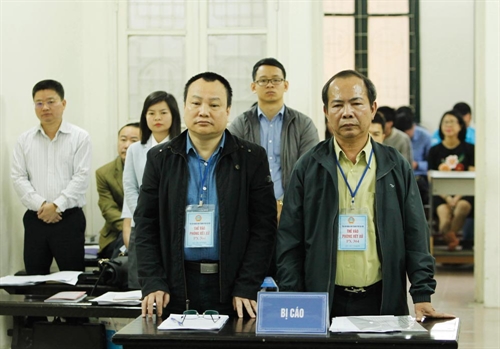Dinh Van Que, LL. M.
Former chief justice
Criminal Tribunal of the Supreme People’s Court
When deciding penalties to be imposed on commercial legal persons (corporate offenders), the court will base itself on the 2015 Penal Code (revised in 2017) (the Code) to consider the nature and extent of social danger of their committed crimes as well as circumstances affecting their penal liability.
Bases for deciding penalties
The bases for deciding penalties to be imposed on offenders are provided in Article 50 of the Code. However, Article 83 of the Code provides more specific bases for deciding penalties on corporate offenders, including their law observance history. Law observance history of corporate offenders is similar to personal history of individual offenders.
If the law observance of a corporate offender before the crime commission and after the crime commission and before trial is assessed as good, penalties to be chosen by the court to impose on it for a certain crime should be lighter than those to be imposed on one with a poor law observance history, as long as other circumstances of the case are similar.
For example: Company A and company B are both charged for tax evasion under Article 200.3 of the Code. As company A has been administratively sanctioned for several times and did not cooperate with proceeding-conducting bodies during the settlement of the case, while company B has never been administratively sanctioned and was cooperative in working with proceeding-conducting bodies, the court could impose the penalty of operation termination on company A while only ordering company B to suspend its operation for one year.
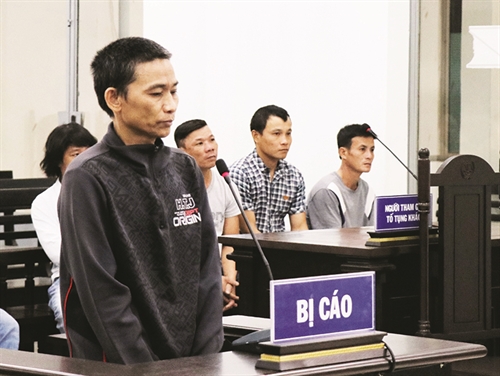 |
| Defendant Phan Van Binh, who is accused of carrying out activities aimed at overthrowing the people’s administration, at the court hearing on Jan. 22 in Khanh Hoa province__Photo: Tien Minh/VNA |
Penal liability-extenuating circumstances
First, having prevented or mitigated the harm caused by the crime: This extenuating circumstance is the same as that prescribed in Article 51.1.a of the Code. However, for a corporate offender, the prevention or reduction of the harm of a crime may be carried out by the corporate itself or its leader for its own interest. If the corporate’s leader is also criminally charged, this circumstance may be treated as a “dual” one when deciding penalties on the corporate and on its leader.
Second, having voluntarily redressed or compensated for damage or remedied consequences: This extenuating circumstance is the same as that prescribed in Article 51.1.b of the Code. If the leader or an employee of a corporate offender is criminally charged, this circumstance may be applied to both the corporate and individual offenders.
Third, committing a crime with no damage or minor damage caused: This extenuating circumstance is the same as that prescribed in Article 51.1.h of the Code and may be applied like the aforesaid circumstances.
Fourth, actively cooperating with responsible authorities in detecting the crime or settling the case: This extenuating circumstance is the same as that prescribed in Article 51.1.t of the Code and may be applied like the aforesaid circumstances.
Fifth, having made many contributions to the implementation of social policies: This extenuating circumstance is applicable only to corporate offenders and similar to that prescribed in Article 51.1.v of the Code. However, for individual offenders who have made outstanding achievements in production, military service, study or work, their achievements must be recorded and recognized by state agencies or social organizations with various commendation and rewarding forms such as certificate of merits, medal, order and other honorable titles. Meanwhile, to be counted as an extenuating circumstance, contributions of corporate offenders to the implementation of social policies, such as sponsoring sports tournaments or art performances, building gratitude houses, providing aid to flood victims, poor pupils or fallen heroes’ families, only need certification from local administrations or responsible state agencies or social organizations.
When deciding penalties on a corporate offender, the court may rely on circumstances other than those listed in the Code as extenuating ones but must clearly state reason(s) for extenuating the corporate’s penal liability in the judgment. It should be noted that extenuating circumstances that are prescribed by the Code as factors for determining the crime or penalty bracket may not be further used as extenuating circumstances for deciding penalties.
Penal liability-aggravating circumstances
First, colluding with another corporate to commit a crime: This circumstance is similar to the circumstance of committing a crime in an organized manner applicable to individual offenders. For the reason that crimes of corporate offenders are always committed in an organized manner, it is unnecessary to regard committing a crime in an organized manner as an aggravating circumstance for them but lawyers still find it necessary to determine a similar circumstance of broader nature to be applied only to corporate offenders.
Second, intentionally carrying out a crime to the end: This circumstance is the same as that prescribed in Article 52.1.e of the Code.
Third, having committed a crime twice or more: This circumstance is the same as that prescribed in Article 52.1.g of the Code.
Fourth, recidivism or dangerous recidivism: This circumstance is the same as that prescribed in Article 52.1.h of the Code.
Fifth, taking advantage of a war, a state of emergency, a natural disaster, an epidemic or another special difficulty situation of the society to commit a crime: This circumstance is the same as that prescribed in Article 52.1.l of the Code.
Sixth, employing a sophisticated trick to commit or conceal a crime or to abscond: This circumstance is partly identical to that prescribed in Article 52.1.m of the Code. The difference is the absconding or crime-concealing purpose of the employed sophisticated trick.
Unlike extenuating circumstances which can be more than those prescribed in the Code, only aggravating circumstances prescribed in the Code may be applied by the court when deciding penalties on corporate offenders. Aggravating circumstances that are prescribed by the Code as factors for determining the crime or penalty bracket may not be used again as aggravating circumstances for deciding penalties.
Penalties
Corporate offenders, i.e. companies or enterprises, cannot be imprisoned or subject to non-custodial reform. They may only be subject to such penalties as closedown, termed suspension of operation, ban from conducting certain business lines or monetary fines. These penalties primarily aim to ensure a healthy business and competitive environment for all economic sectors to operate.
Under Article 33 of the Code, principal penalties that may be imposed on corporate offenders include fine, suspension from operation and termination of operation. Additional punishments include prohibition from doing business or operating in certain areas, prohibition from raising capital and fine, when it is not imposed as a principal penalty.
Principal penalties
Fine can be a principal penalty imposed on corporate offenders under Article 77 of the Code. Fine level is based on the nature and severity of crimes as well as the financial status of corporate offenders and inflation, but must not be lower than VND 50 million.
The court may only impose a fine on a corporate offender as an additional penalty if having not imposed it as a principal penalty.
The court wishing to impose a fine on a corporate offender as a principal penalty should base itself on the minimum and maximum fine levels applicable to such offender. For example: Company A is convicted of tax evasion under Article 200.2 of the Code which carries a fine range of VND 500 million to 1.5 billion. Depending on the nature and extent of social danger of the crime committed by company A as well as circumstances extenuating and/or aggravating its penal liability, the court may impose a fine of VND 700 million. In case company A has several extenuating circumstances and no aggravating one, a fine to be imposed for its crime may be reduced to under VND 500 million or even under VND 100 million (the minimum fine under Article 200.1 of the Code) but must not be lower than VND 50 million.
Under Article 78 of the Code, suspension from operation for a definite term means temporary cessation of operation of a corporate in one or more than one field in which the corporate commits a crime causing damage to human life or health, environment, or public security, order and safety, and consequences of such crime can be remedied in reality.
It is not easy to determine whether or not a corporate offender is able to remedy consequences of its crime. In order to avoid operation termination, a corporate offender often gives reasons why it can remedy consequences of its crime within a specified period. In order to impose this penalty in a fair manner, the court should obtain solid grounds or consult specialized bodies or order on-site inspection to check the corporate offender’s remedying ability. It should also be noted that a corporate offender can only be suspended from operation, for between six months and three years, in one or more than one business line in which it commits a crime, not all of its business lines, and it may continue operating in unaffected business lines.
The Code does not mention the possibility of a corporate offender having an extenuating circumstance to have its operation suspended for under six months. However, as per the Code, a corporate offender with many extenuating circumstances could be given a penalty at the minimum level or even a lighter penalty.
Under Article 79 of the Code, termination of operation means termination of operation of a corporate in one or more than one field in which it commits a crime causing or practically likely to cause damage to the lives of many people, causing environmental incidents, or causing adverse impacts on public security, order and safety, and consequences of such crime cannot be remedied. A corporate offender can only have its operation, in one or more than one business line in which it commits a crime, terminated, and may continue operating in business lines not subject to termination. When ruling to stop the operation of a corporate offender in one or several business lines, the court should base itself on the damage caused or likely to be caused in reality by the corporate’s crime in such business line(s) which the corporate is unable to remedy or might badly impact public security, order and safety.
A corporate offender that has registered its operation in one or several business lines which is terminated under the court judgment or receives the additional penalty of prohibition from doing business or operating in certain business lines may register with a competent state agency to continue operating in other business lines to avoid being dissolved. A company founded only to commit a crime will have its operation terminated in all registered business lines and be dissolved immediately.
Additional penalties
In addition to principal penalties, the court may impose the additional penalty of prohibition from doing business or operating in certain business lines when deeming that allowing the convicted corporate to continue doing business or operating in such business lines may cause harm to human life and health or to the society. The court should clearly state in the judgment business lines in which the convict is prohibited to do business or operate. Even in case the court imposes the principal penalty of operation suspension or operation termination, the prohibition from doing business or operating in certain business lines imposed as an additional penalty should only last for a period of from one year to three years after the judgment becomes legally effective.
Prohibition from raising capital may be imposed an additional penalty when the court sees that allowing the convicted corporate to raise capital may run the risk of its relapse into committing a crime. Prohibition from raising capital includes prohibition from borrowing capital from credit institutions, foreign bank branches or investment funds; prohibition from issuing or offering securities; prohibition from raising capital from clients; prohibition from forming domestic and overseas joint ventures and partnerships; and prohibition from forming real estate trust funds. The court may decide to apply one or several of these forms for between one year and three years from the date the judgment becomes legally effective.
Fine may be imposed as an additional principal penalty on corporate offenders that have their operation suspended or terminated. Fine levels should be based on the nature and severity of crimes as well as the financial status of corporate offenders and inflation but must not be lower than VND 50 million. For each crime, a corporate offender may be fined only once.
Aggregation of penalties under multiple judgments
In case a convicted corporate offender currently serving a judgment is adjudicated for a crime committed before such judgment is rendered, the court may decide on a penalty for the crime tried, then decide on the aggregate penalty.
The period of having served the penalty under the previous judgment on operation suspension, prohibition from doing business in certain business lines or prohibition from operation in certain business lines, or prohibition from raising capital may be included in the term of serving the aggregate penalty. In case a convicted corporate offender has to serve multiple legally effective judgments but penalties under these judgments have not yet been aggregated, the justice may aggregate these penalties.
Penalty exoneration for corporate offenders
The Code does not address the case of exemption from penal liability for corporate offender but just provides for the exoneration from penalties for them, saying that once having remedied all consequences of its crime and compensated for all damage caused, a corporate offender will be entitled to penalty exoneration.-
